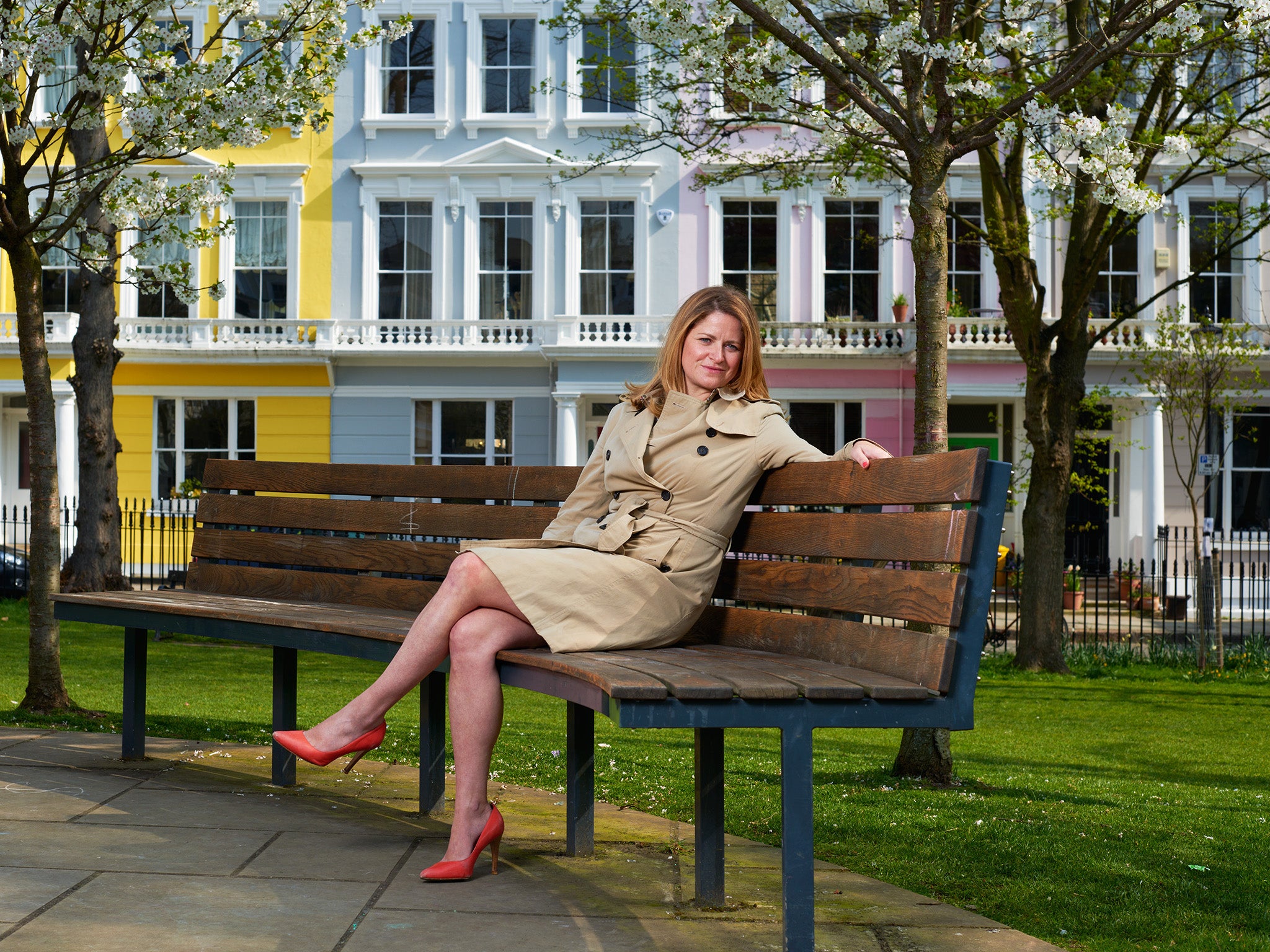Author Liza Klaussmann interview: Relative of Moby Dick on her new book Villa America
Liza Klaussmann tells James Kidd about her Jazz Age novel set in Antibes

Your support helps us to tell the story
From reproductive rights to climate change to Big Tech, The Independent is on the ground when the story is developing. Whether it's investigating the financials of Elon Musk's pro-Trump PAC or producing our latest documentary, 'The A Word', which shines a light on the American women fighting for reproductive rights, we know how important it is to parse out the facts from the messaging.
At such a critical moment in US history, we need reporters on the ground. Your donation allows us to keep sending journalists to speak to both sides of the story.
The Independent is trusted by Americans across the entire political spectrum. And unlike many other quality news outlets, we choose not to lock Americans out of our reporting and analysis with paywalls. We believe quality journalism should be available to everyone, paid for by those who can afford it.
Your support makes all the difference.By rights, I should be talking to Liza Klaussmann on the Cote d’Azur. Her new novel, Villa America, takes its title from Gerald and Sara Murphy’s lavish home near Antibes which played host to hi-jinx involving Scott and Zelda Fitzgerald, Ernest Hemingway (accompanied by present and future wives), John Dos Passos and Pablo Picasso.
In the event, a café near Klaussmann’s adopted London home in Primrose Hill will have to do. And while cocktails – possibly Gerald Murphy’s own tipple, a “Bailey” – are in short supply, this is probably just as well as I instantly mispronounce Klaussmann’s first name (that’s Liza with an eye).
Klaussmann doesn’t seem fazed. In person she is as zesty as her prose, which manages to be both reflective and entertaining. When I ask what Villa America means to her today, the Brooklyn-born writer starts with a sleek elevator pitch before coming over all romantic. “There’s no way around it, the book’s about love. Whether it’s love for your children, your lover, your spouse, your friends, or your frenemies.”
One can only speculate how Hemingway might have responded to being called a “frenemy”, but Klaussmann does identify the fusion of veneration and neediness, cruelty and exhibitionism that defined Le Gilded Generation in the South of France. As love was all around Villa America, I ask if Klaussmann felt the same for her emotionally promiscuous show-offs. She is not blind to their faults. “You could be alienated by this group. They don’t work. They sit around arguing and painting and getting drunk. I think sometimes they are a bit too precious.”
Nevertheless, she fell for their drama and mystique. “I felt very sympathetically towards them. Even Ernest Hemingway, who deserves a big punch in the face. He’s a genius. People who have that sort of temperament are crazy. You can’t hold them totally responsible for their evilness.”
The exceptions to the braggadocio might be the Murphys themselves, who were not so in awe of their friends’ talent as to be immune to their flaws. Gerald attained minor fame as an artist – his paintings hang in MOMA and the Guggenheim – but the Murphys’ real talent was for social engineering. “There’s definitely the idea of making an idealised version of America in France. They were going to change the world. They left behind their country, which they found disappointing politically and culturally, and arrived in a place destroyed after the war where they could rebuild a Utopia for themselves.”
The couple were not just hosts but muses – Sara especially, whom Picasso painted many times. Literary homage was paid by Dos Passos, Hemingway and the poet Archibald MacLeish. Everyone struggled to pin down the Murphys’ je ne sais quoi. “Whenever MacLeish wrote a poem about them or Dos Passos a book, they tried to capture that glow they gave off, which seems almost impossible. I found that myself. It’s called an X-factor for a reason.”

Undoubtedly Gerald and Sara’s most famous fictional incarnations are Dick and Nicole Diver in Fitzgerald’s Tender is the Night. Klaussmann, however, isn’t sure where the Murphys end and Scott and Zelda begin. “Tender is the Night doesn’t have a great deal of their actual personalities. The drunken benders and affairs with young girls has more of Fitzgerald than Gerald Murphy. One of the things you do see in Tender is the Night is Sara’s generous spirit.”
What she does accept is the chutzpah it took to follow such famous leads. “It definitely gave me pause,” she laughs. But she felt the risk of walking on Gilded Age splinters was justified by an attempt to refresh parts of the Murphys lives that other writers have failed to reach. “If you are going to be arrogant enough to fictionalise somebody’s life, there has to be space for you. You need something unknown that you can shed light on.”
That “unknown something” was Gerald’s repressed attraction to men, glimpsed in his friendship with Cole Porter and macho rivalry with Hemingway. Klaussmann dramatises it in an entirely fictional affair with a pilot called Owen Chambers. “Nobody had come out and said that Gerald Murphy was gay ... [Biographers] were always saying, [Gerald] felt himself too effeminate. What the hell does that mean?”
Klaussmann also found personal echoes in the Gildeds’ burn-and-crash – namely, how their Icarus-like trajectory represented anxieties about her writing career. She made considerable waves with her first novel, Tigers in Red Weather, a racy marriage perhaps of Richard Yates and Jacqueline Susann. A big deal before publication (six figures, so the rumours went), the book was a big deal afterwards, selling strongly on both sides of the Atlantic.
Such rapid success made Klaussmann afraid that the only way was down. “There was an element of feeling like a fraud,” she says about her hit debut. “Then you think, Now I have to do it again? I was taken aback by how fast everything went.”
The hiatus between novels proved frustrating, not least because several new books about the Jazz Age were released. “I felt a little competitive with some writers, or lesser compared to others. What did Gore Vidal say? ‘Every time one of my friends succeeds a little part of me dies.’”
It is tempting to suggest that writing is in Klaussmann’s blood. Herman Melville was her great-great-great grandfather. One of Villa America’s in-jokes has Vladimir Orloff, a friend of the Murphys’, pilfer Moby Dick as a bedtime story for their children. Klaussmann says the connection caused embarrassment at school and weariness later when publicity for Tigers in Red Weather was overshadowed by her revered ancestor.
What Melville’s influence did achieve was persuade his great-great-great granddaughter that “being a writer was this revered job”. Klaussmann’s early literary ambitions were sated by working on the business pages of The New York Times. A job at the International Herald Tribune took her to Paris, where she indulged in some Bohemian bids to mix literature and pleasure. What did she write about?
“Exactly. What was I writing about? We all got drunk last night? I was living across from Hemingway’s favourite café. I thought I was the height of amazing.” Klaussmann began a novel aged 23 but lost it to a malfunctioning computer. “I think it was probably about a twentysomething girl living in Paris working for a newspaper ... ”
Tentative work has started on a third novel, which will embrace Melville head-on, not to mention Martha’s Vineyard and the 1980s music scene. For the time being, she is preparing for the hoopla surrounding Villa America. Klaussmann hopes she is self-confident enough, and possibly self-centred enough, to survive the ordeal. “People who put themselves through this, who expose themselves to ridicule, hatred and critique all in the hope of getting positive recognition, have got to be narcissists.
Extract
Villa America by Liza Klaussmann (Picador, £14.99)
“What’s so funny?” Scott called over from his lounger. “I want to know.”
“You two,” Sara called back. “We’re so glad you’ve come. It’s like joining the circus.”
“I always wanted to join the circus,” Zelda said, and did a little underwater somersault.
“Sara, you can ride the elephant,” Scott said, “and Gerald can be the lion tamer.”
“I’ll be the tightrope walker,” Zelda screeched.
“And I’ll be the sad clown,” Scott said. “I do sad very well.”
“You do it very badly,” Sara said.
“Oh God, you’re right,” Scott said with mock glumness. “I’m awful at it.”
Join our commenting forum
Join thought-provoking conversations, follow other Independent readers and see their replies
Comments